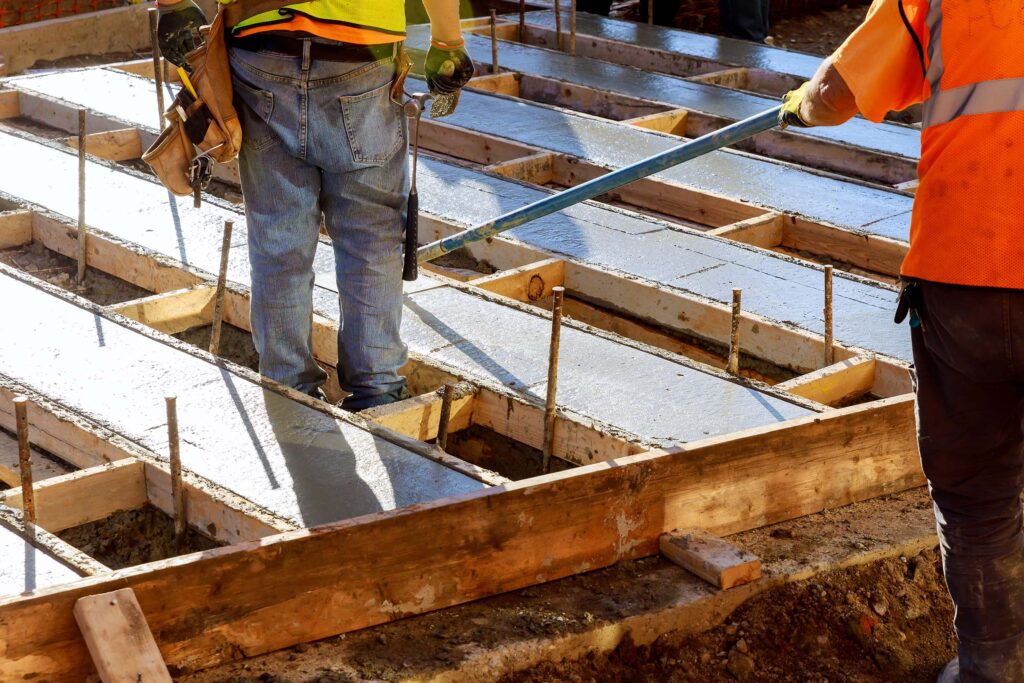Credibility Is a Key Component of Concrete Testing
Concrete is an amazing invention. The very idea of forming and pouring a liquid that turns to stone is nothing short of extraordinary. And because concrete is versatile and readily available, it is often the first choice for many construction projects.
Concrete has numerous benefits in a building project. Concrete can insulate a building. It can provide soundproofing. And concrete is a great environmental choice because it is durable, and can be recycled by adding it to other concrete mixtures.
But not all concrete is created equal. Depending on the needs of the project, fresh concrete might need to be flowing, or stiff. It might need to gain strength quickly, or have minimal shrinkage. It might need to resist salt penetration or have a polished, hardened surface.
Because of concrete’s different uses and applications, the use of poor quality concrete can become a serious problem. That’s why concrete testing is an essential tool that can be used to assess the structural integrity of buildings, bridges, roadways, and other construction.
Construction professionals recognize that there are risks that come from poor concrete testing. For example, if a foundation fails a strength test, yet headwalls and columns are already built on top of the failing concrete, the problem is compounded, creating a massive headache that no one wants to handle.
And, unfortunately, some testing agencies have been known to falsify concrete testing reports.
To prevent costly problems and avoid compounding them by using unscrupulous concrete testing agencies, it’s best to choose a reliable and proven concrete testing agency like CTL Engineering. We have been offering concrete testing services for more 90 years and have a rare and unique insight into the vulnerabilities of concrete and the best ways to overcome them.
Hire a Credible Concrete Testing Agency
Concrete testing is not a commodity. Hiring an agency to perform concrete testing based solely on price can result in sloppy and imprecise testing, and can end up costing more than the money you thought you were saving. Poor concrete testing can also put the structural integrity of the structures at risk, and endanger the lives of the people who live and work in them.
In some cases, the building owner or developer will obtain concrete testing services. In others, especially in concrete mix designs, the producer or supplier pays for concrete testing.
Regardless of who is leading the charge, the concrete testing technicians you choose should have a thorough array of testing equipment and be able to test both short-term and long-term concrete characteristics.
While concrete specifications are usually defined for suppliers and builders upfront and often require a strength test, it is important to have access to a team who has experience with other aspects of concrete testing and is prepared to deal with other contingencies.
Construction projects need comprehensive concrete testing by experts who understand the subtleties of concrete and construction.
CTL’s engineers have a solid grounding in the science of concrete mixing, handling, placing curing, and more. Our concrete testing services include:
- Mix designs
- Field Testing and inspections
- Compressive strength and air content
- Consistency and yield
- Flexural and split tensile strength
- Modulus of elasticity
- Drying shrinkage
- Rapid choice permeability
Compressive Strength Testing
The most common concrete strength test is, by far, the compression test on concrete cylinders. CTL performs thousands of these tests every year in all of our locations.
Concrete test cylinders are cast at the same time concrete is poured on site. The cylinders should be accompanied by the air test, workability (slump) test and temperature. The cylinder samples are used to determine the strength of the concrete as delivered.
Concrete’s compressive strength determines whether the concrete placed in a structure can bear the weight of what’s on top of it, or whether it will crack and crumble causing the structure to fail.
The most common misunderstanding about compressive strength testing is that the strength of a lab-cured cylinder tells how strong the structure is. Instead, compressive strength testing is used to determine how strong the concrete mix is when delivered to the project. Samples that are cured at the same temperature and moisture condition as the structure represent the structure better.
Masonry mortar and grout are also tested for compressive strength. This testing involves crushing cubes or prisms of hardened samples a compression machine.
Flexural and Tensile Strength Testing, and More
Although less common, the flexural strength test on paving projects also measures a fundamental strength property of concrete. They focus on concrete’s capacity to resist failure and fatigue under different types of dynamic loads.
CTL also specializes in both indirect tensile strength on RCC (roller compacted concrete) and uniaxial tensile strength on concrete in existing structures.
Flexural Testing on Paved Projects
Flexural strength is the capacity of the concrete to resist failure under bending moment.
Tensile Strength Tests (Pull off tests)
Tensile strength is the capacity of concrete to resist fracture by tension. Tensile testing is a fundamental test in which the concrete is subjected to a controlled tension until failure. This is an important test, as the tensile strength of concrete is relatively low compared to its compressive strength. Concrete structures are tested by the pull off test before and after a bonded overlay or bonded fiber reinforcement.
Beyond standard strength tests, CTL offers specialty work such as:
- Rapid Chloride Permeability
- Strength gain by maturity method
- Drying shrinkage
- Creep in compression
- Young’s Modulus and Poisson’s Ratio
- Chloride Migration Coefficient by NT Build 492
- Alkali-Silica Reactivity of Concrete Aggregates
- Forensic evaluation of existing concrete structures
CTL can also prepare and test Portland cement concrete mixes for optimization studies to ensure the proper mix design for specific jobs.
Typical Testing Timeframes
Some concrete tests take two minutes, while others can take two years. Each project may have different specifications.
Specialized projects take longer and may be ongoing. For example, CTL is currently testing a particular concrete for the Wellsburg Bridge over the Ohio River. This concrete must be able to last for 100 years in rain, snow, and other outdoor elements.
Build Safety Into Concrete Construction
At CTL, we make a point of ensuring our concrete testing experts are fully trained and certified according to the highest industry standards. We also ensure that our testing equipment remains properly calibrated for precise, accurate measurements.
That’s the kind of dedication, professionalism, and experience required to build safety into concrete construction.

